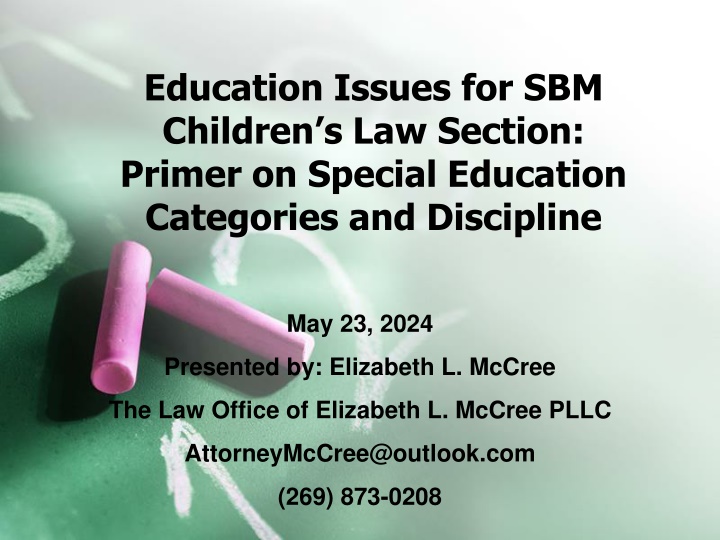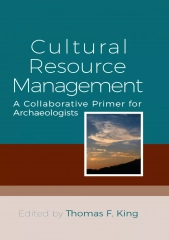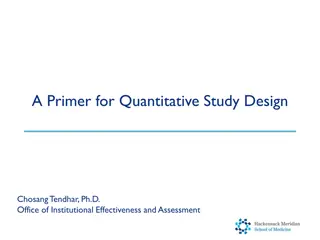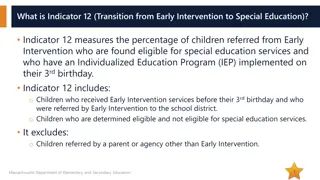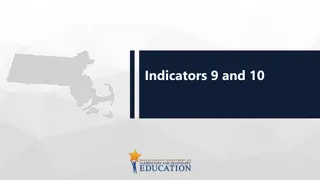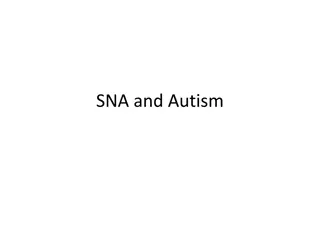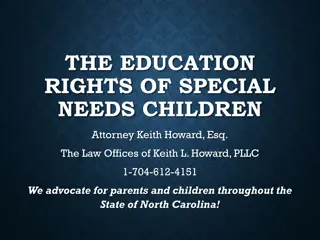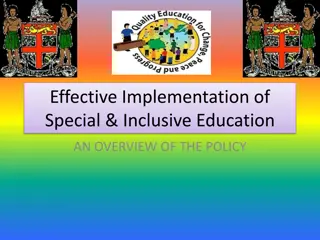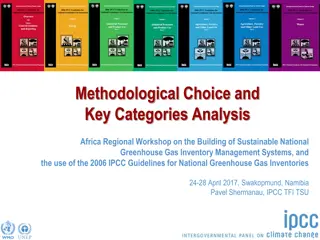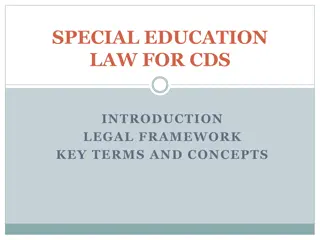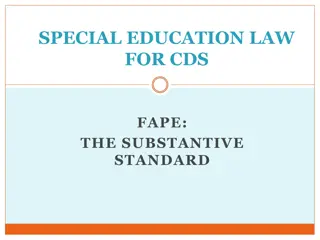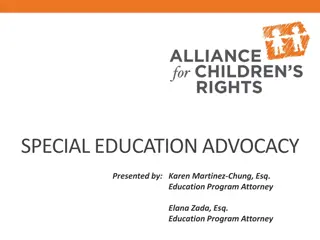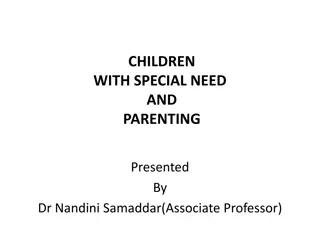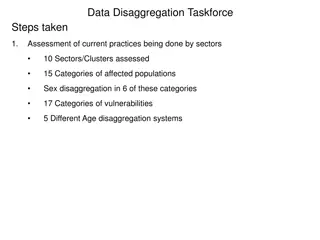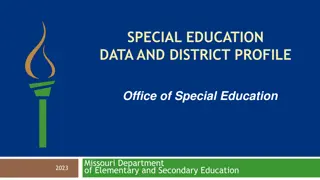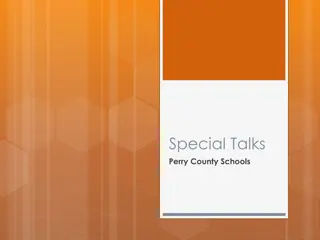SBM Children's Law: Primer on Special Education Categories
This presentation by Elizabeth L. McCree provides a comprehensive overview of special education categories and discipline issues concerning children under the SBM Law section. Gain valuable insights into the legal aspects affecting special education policies and practices in a concise and informative manner. A must-watch for educators, parents, and professionals involved in supporting children with special educational needs.
Download Presentation

Please find below an Image/Link to download the presentation.
The content on the website is provided AS IS for your information and personal use only. It may not be sold, licensed, or shared on other websites without obtaining consent from the author.If you encounter any issues during the download, it is possible that the publisher has removed the file from their server.
You are allowed to download the files provided on this website for personal or commercial use, subject to the condition that they are used lawfully. All files are the property of their respective owners.
The content on the website is provided AS IS for your information and personal use only. It may not be sold, licensed, or shared on other websites without obtaining consent from the author.
E N D
Presentation Transcript
Education Issues for SBM Children s Law Section: Primer on Special Education Categories and Discipline May 23, 2024 Presented by: Elizabeth L. McCree The Law Office of Elizabeth L. McCree PLLC AttorneyMcCree@outlook.com (269) 873-0208
Special Education Categories: Relevant Law IDEA-Individuals with Disabilities Education Act Ages 3-21 (before this-Early On) MARSE-Michigan Administrative Rules of Special Education (ages birth-26) 504 plans-Section 504 of the Rehabilitation Act ADA-Americans with Disabilities Act FERPA-Family Education Rights and Privacy Act
IDEA Special Education Categories 1) Intellectual Disabilities/Cognitive Impairment 2) Emotional and Behavioral Disabilities/Emotional Impairment (EBD/EI) 3) Traumatic Brain Injury (TBI) 4) Other Health Impairment (OHI) 5) Autism Spectrum 6) Early Childhood Developmental Delay (ECDD) 7) Speech and Language Impairment 8) Specific Learning Disability (SLD) 9) Physical Impairment 10) Deaf and Hearing/Auditory Impairment 11) Visual Impairment 12) Deaf/Blindness 13) Severe Multiple Impairment
Why does the category matter? DOES THE ISSUE IMPACT LEARNING Ties into services Many Michigan districts won t do primary and secondary-primary only Manifestation for discipline (MDRs) Continued eligibility as the child ages SSDI Subsidy
Intellectual Disabilities Based on IQ Mild 50-70 Moderate 35-50 Severe (SID) 20-50 Profound (PID) below 20 Has your client had an evaluation, trauma assessment, etc. in your case where IQ was determined? Does it match the IEP? Does it precede an IEP?
Emotional & Behavioral Disabilities (EBD/EI) Psychosis Schizo-Affective Disorders Depression PTSD Eating Disorders
Traumatic Brain Injury (TBI) Child Abuse! Accidents Sports Injuries This is different than much of the trauma we see in our client. Often involves one specific physical incident that significantly altered the child s brain. But as we learn more about how trauma impacts the brain this area is expanding.
Other Health Impairments (OHI) Disability caused by disease, condition, disorder or injury ADD/ADHD Asthma Diabetes Cancer FASD
Autism Anything on the spectrum Testing-depends on your district. Some will only accept testing from the CMH. Some RESAs test. Some allow evaluation from outside orgs (LOGAN) and doctors (rare).
Specific Learning Disabilities (SLD) Largest percentage Disability is NOT due to intellectual disability, hearing, emotional issues, etc. Specific issues with reading, writing, arithmetic, language Dyslexia controversy
Orthopedic Impairments Impairment of the body that is severe enough to negatively impact educational ability Cerebral Palsy Multiple Sclerosis Important if the student needs a paraprofessional or specific (expensive) equipment. If a student has another disability but needs the assistance you have to push for this as secondary. Some of the pushback is due to payment for the equipment (school wants Medicaid or parent s insurance to pay).
Visual Impairments Glaucoma Cataracts Legal Blindness More of this with the move to computer learning! Many of your older kids haven t been tested for vision in a long time, and if they ve bounced around they may have missed this testing!
ECDD Newer category Up to age 7 Specialized classrooms 3-6 in many districts Many children born with substances present- hope is that delays may subside. These children likely had Early On.
How to Start the Process REED-Review of Existing Evaluation Data WRITTEN REQUEST School has 30 school days to complete Can be extended for good cause-parent/guardian MUST agree to an extension
Discipline: Initial Considerations Code of Conduct Remember when you got that planner at the beginning of the year with a bunch of writing in the back? If the child comes after the formal start of school, are they receiving the code? Schools move quick-partially because they have to, partially to avoid lawyers showing up FERPA-used as an excuse to not give you information (video from the bus fight, etc.)
7 Factors These factors are required to be considered by any district per the Revised School Code: Student age Disciplinary history Disability Seriousness of behavior Safety risk Use of Restorative Practices Level of Intervention
Due Process Fairness dictates that students be given notice of the types of conduct which are prohibited and the potential consequences of the misconduct. A school s rules and procedures for suspending or expelling a student should be outlined in the Code of Conduct or handbook adopted by the local board of education.
Discipline Options Short term suspension 10 days or less minimal due process protections, including oral or written notice of the accusation(s), what disciplinary measures are being proposed, and an opportunity to respond. notice and hearing should precede the student s removal from school unless student is a danger. Long term suspension More than 10 days Rebuttable presumption MDR for special education students Expulsion
Required Suspensions and Expulsions Permanent Expulsion-possession of a dangerous weapon in a weapon free school zone dangerous weapon means a firearm, dirk, dagger, stiletto, iron bar, knife with a blade over 3 inches in length, pocketknife opened by a mechanical device, and brass knuckles. MCL 380.1313(4) Exceptions: The object or instrument possessed by the student was not possessed for use as a weapon, or for direct or indirect delivery to another person for use as a weapon. The weapon was not knowingly possessed by the student. The student did not know or have reason to know that the object or instrument possessed by the student constituted a dangerous weapon. The weapon was possessed by the student at the suggestion, request or direction of, or with the express permission of school or police authorities Permanent Expulsion (possibility of reinstatement)-Arson, CSC against another student, physical assault of a school employee, contractor or volunteer *ON CAMPUS* Long term suspension or expulsion-a student grade 6 or above who physically assaults another student *no more than 180 days* or makes a bomb threat
Long Term or Expulsion-Now What? Appeal-Department of Education and Court options Ask for alternative schooling options Adult education if student will be 16 by September when decision made Petition for reinstatement
